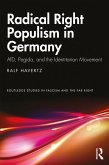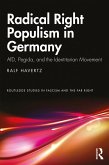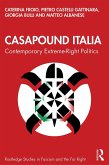Based on research in public and private archives in four countries, the book shows when, why, where, how, by and for whom the table talks were written, how reliable the texts are, and how historians should approach and use them. It reveals the crucial role of the mysterious Swiss Nazi Francois Genoud, as well as some very poor judgement from several famous historians in giving these dubious sources more credibility than they deserved. The book sets the record straight regarding the nature of these volumes as historical sources - proving inter alia The Testament to be a clever forgery - and aims to establish a new consensus on their meaning and impact on historical research into Hitler and the Third Reich.
This path-breaking historical investigation will be of considerable interest to all researchers and historians of the Nazi era.
Dieser Download kann aus rechtlichen Gründen nur mit Rechnungsadresse in A, B, BG, CY, CZ, D, DK, EW, E, FIN, F, GR, HR, H, IRL, I, LT, L, LR, M, NL, PL, P, R, S, SLO, SK ausgeliefert werden.
"Nilsson's book provides historical research at its best. Grounded in exhaustive study of primary sources he paints a gripping picture of how historiography for far too longfollowed misleading narrartives. His fascinating findings provide lessons for historians and the wider public how to apply critical rationality and shrewd analysis of documents. It's a feast of enlightenment." - Magnus Brechtken, University of Munich, Germany
"In a series of hard-hitting and well-researched articles, Mikael Nilsson has shown that Hitler's fabled 'Table-talk' and 'Political Testament' cannot be used as direct evidence of what he actually said. His work is essential reading for anyone wishing to understand the challenges which his biographers face." - Brendan Simms, University of Cambridge, UK
"Mikael Nilsson provides an unsparing but long-overdue critique of one of the touchstone sources of Hitler scholarship. Future biographers will be well-served to read Nilsson's meticulously researched analysis before turning to Hitler's table talk conversations and monologues. Hitler Redux is fascinating, sobering, enlightening." - Timothy W. Ryback, Director of the Institute for Historical Justice and Reconciliation in Paris, France









